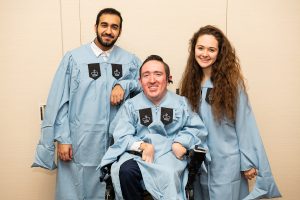Course Offerings

Required Courses
GR5120 Research in Economics
This is a required course that facilitates the capstone research paper writing process for second-year students enrolled in the M.A. Program in Economics. The research paper provides an opportunity to write a substantial piece of academic work in which the student is expected to demonstrate mastery of a field, along with the ability to think originally and to convey results clearly in writing.
GR5211 Microeconomic Analysis I
Decision theory, theory of the firm, and consumer behavior; introduction to general equilibrium theory and welfare economics.
GR5212 Microeconomic Analysis II
Game theory, including extensive form solution concepts, bargaining, and repeated games; information economics, contract theory and mechanism design.
GR5215 Macroeconomic Analysis I
Macroeconomic theory applied to aggregate supply and demand and their components, designing and implementing macroeconomic policy goals and forecasting GDP and its components. Models of national income determination; sectorial inflation; labor markets, production theories, and aggregate supply models; supply and demand for money; foreign trade and balance of payments.
GR5216 Macroeconomic Analysis II
Classical and Keynesian macroeconomic thought, modern-day microeconomic theories of money-wage and price determinations, and reconstruction of macro theory.
GR5410 Mathematical Methods for Economists
Applications of mathematics to economics: functions, simultaneous equations; linear models and matrix algebra; determinants, inverse matrix, Cramer’s rule; differentiation and optimization of functions of one or more variables; quadratic forms, characteristic roots and vectors, constrained optimization; interpretation of the Lagrange multiplier. Techniques applied to examples from the theory of the firm and consumer behavior.
GR5411 Econometrics I
Review and introduction of topics in probability and statistics needed to understand applied statistics and econometric techniques for quantitative research and analysis. The topics reviewed include random variables, discrete and continuous probability distributions, mathematical expectations, estimation and inference. The topics introduced include simple and multivariate regression models, least squares estimation, hypothesis testing, and specification analysis.
GR5412 Econometrics II
Introduction of topics needed to understand advanced applied statistics and econometric techniques for quantitative research and analysis. Topics include the Generalized Regression Model, Instrumental Variables, Systems of Equations, Panel Data Analysis, Discrete Choice Models and Time Series Analysis.
Elective Courses
Students are expected to complete at least nine credits from elective courses.
GR5110 Fieldwork in Economics
This course provides an opportunity for students in the Economics Master of Arts Program to engage in off-campus internships for academic credit that will count towards their requirements for the degree. The internships will facilitate the application of economic skills that students have developed in the program and prepare them for future work in the field.
GR5218 Advanced Microeconomics
The class will build on the tools introduced in Microeconomics I and II and show how they are applied to illuminate economic relationships. Some of the topics the course will discuss are: game theory and its use in international organization; recent theories of decision-making; auctions and market design.
GR5220 Advanced Macroeconomics
This class will familiarize students with advances in monetary economics, business-cycle theory, and growth theory. It will teach tools to model inflation and output dynamics and the role of optimal monetary policy. It will discuss theory and evidence of fiscal stabilization policy.
GR5311 Economic Policy Analysis
The purpose of this course is to show how economic methods can be used to inform economic policy in a wide range of areas pertaining to development, health, education, and labor. Specific topics will be chosen each year; the class will introduce widely applied econometric techniques and discuss the relevant empirical literature.
GR5415 Advanced Econometrics
The class emphasizes practical applications of econometric theory. The course will discuss the issues that arise in specifying, estimating, and testing microeconomic and macroeconomic theories. Students will learn how to apply these methods on real-world data.
GR5711 Financial Economics
This class will discuss financial markets and asset pricing from the perspective of economic theory. While the stress will be on modeling and tools, the course will also introduce the empirical methodologies and the calibration techniques used in financial economics, as well as some of the most recent evidence on asset prices.
GR5911 International Economics
This course covers both microeconomic and macroeconomic aspects of international relations. It will introduce the theory of international trade and of trade policy, as well as the main concepts of open- economy macroeconomics and international finance.
GR5250 Industrial Organization
The focus of the class is to familiarize students with the way economists in academic, antitrust regulatory and private sector settings approach research questions related to topics such as conduct, pricing, competition or ownership and control in various market structures (e.g., homogenous product, differentiated product, two-sided, vertical markets).
GR5911 Advanced Financial Economics
The focus of the course is on applied methods, including training with financial data, estimation methods, and identification strategies for causal analysis in finance research. Students will cover papers and gain practical experience in execution algorithms, machine learning in asset pricing, asset demand systems, financial intermediaries, trading costs, and passive investments.

